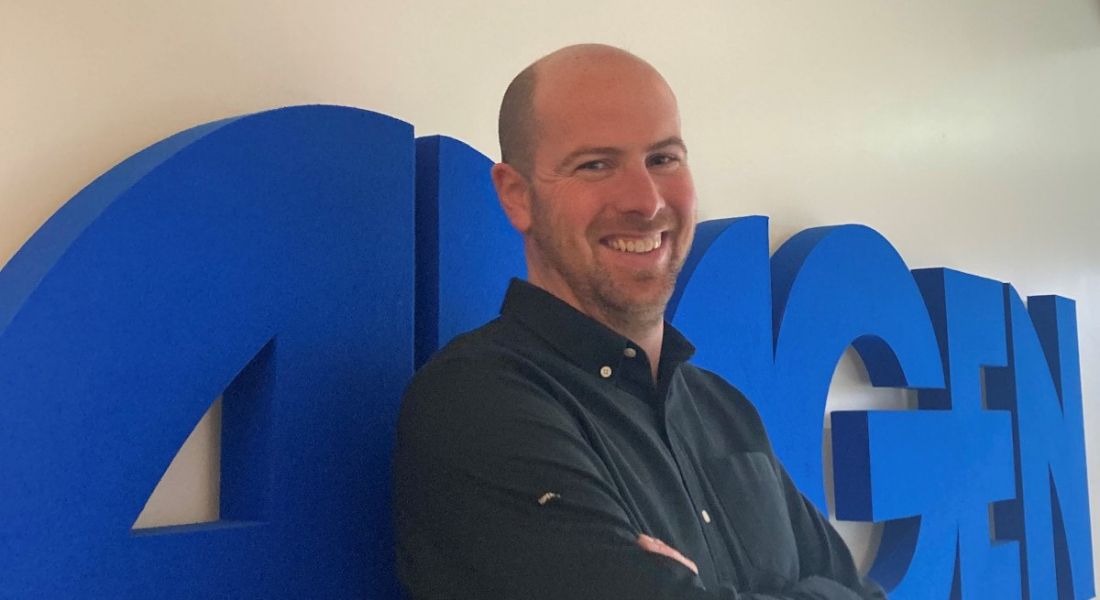Amgen’s Ronan Hayes shares the challenges that come with working in a biotech plant and how he stays productive while on the move.
Ronan Hayes is a chemical engineer who has worked in the gas, chemical and biotech industries for more than 20 years in various maintenance, technical and operations management roles.
He currently works as a senior engineering manager with Amgen at its Dún Laoghaire site, leading a team of technicians, engineers and managers to maintain and operate the facility’s fill-finish production lines.
‘There is no room for error in a fill-finish production environment’
– RONAN HAYES
If there is such a thing, can you describe a typical day in the job?
I start early in the morning and check in with my own teams initially prior to attending cross-functional meetings with day staff to ensure we all know the timeline and objectives for the day. There can be multiple competing priorities that need to be assessed or resourced and these initial decisions we make can have a big influence on the day’s output.
Once everyone is aligned, we take some time to complete more in-depth analysis of plant performance metrics over the last number of days and review any new changes to the upcoming production plans.
We have a very structured approach to meetings and the cycle that we follow to manage the plants with tactical morning meetings and more strategic forums in the afternoons.
As the day evolves, I work with the team to progress the plan and we provisionally set up the incoming shift ensuring they have the equipment access and resources to deliver their tasks overnight.
In the evenings I ensure the overnight plan is interpreted properly and we have some time to work on team improvements or projects as the meeting schedules are reduced.
What types of engineering project do you work on?
Currently the site is expanding so we have a complex operation to maintain existing production capacity and integrate in our new services and interconnecting equipment into the facility.
This project involves a significant amount of coordination between the project team that are busy designing and commissioning the new facility with the existing site operations so that we maximise any maintenance or shutdown opportunities to benefit both areas of activity.
As the project progresses, we will transition various groups to the new line so that we can utilise their knowledge and experience from the existing operation in the start-up activities.
What skills do you use on a daily basis?
As an engineer, I use the obvious logical and analytical skills you might expect someone in a technical role to use. However, I have also found throughout my career, that some of the more successful engineers I have worked with always knew how to get the best out of the people they work with and ensured they always had the right people around them to make them successful.
I don’t claim to understand how every machine or system in the plant works but I do try to ensure I have the right team that has the technical knowledge and experience to operate, maintain and understand the complex equipment we use in our processes.
Working with people to solve problems and understanding the capabilities of the team you work with are key transferrable skills you need as an engineer, coupled to having the capacity to understand the technical elements of the role.
Over time I hope to expand my own personal knowledge of the new processes we are developing. But for now, having the right people here already to do that is where my focus lies.
What are the hardest parts of engineering?
In our industry, any mistakes are expensive or can lead to a loss of valuable production capacity. To proactively avoid issues you need as much pertinent data as possible to support your decision-making processes and apply a logical thought process consistently when evaluating the available options.
Priorities can change rapidly. The dynamic elements of the job that I find interesting can also mean that if there is an issue on a particular line, you may need to shift your entire plan to support a complex investigation or plan and execute a repair in a compressed amount of time.
Communication must be clear and unambiguous. Working in a shift environment, we transfer information from process to process, shift to shift, day to day on a continuous basis. I am constantly reinforcing messages and trying to ensure that any commitments we make can be interpreted easily by the team and executed efficiently.
There is no room for error in a fill-finish production environment and everyone is acutely aware of the importance of good documentation practices, contemporaneous record-keeping and using systems to record each step and operation in the process.
Thankfully we use systems that support us in making and recording decisions that means we can focus on trying to provide the best possible outcome each time.
Do you have any productivity tips that help you through the day?
I try to stick to a routine and hold key appointments or touchpoints with my own team as much as possible during the day. This reduces the need to disturb people outside of these core times and enables me to leave them to work on their own tasks without interruption as much as possible.
I am trying to protect time for the development of any initiatives that are within my own control or that will improve the day-to-day process for the team but you need to be very disciplined to do this.
Amgen uses a good system of visual aids and dashboards coupled to short virtual meetings that enable us to quickly filter information up and down the organisation. Being an engineer, I am logical and structured as you would expect and still use notebooks and plant walks to make my time as productive as possible when I am on the move.
What skills and tools are you using to communicate daily with your colleagues?
I use the regular software packages that most people would be familiar with like Webex, Outlook and Microsoft Teams for general communication and some more specific ones like Miro for whiteboards and One Note for collaboration across various teams.
Due to the complexity of our processes, we employ a range of software packages to visualise the plant status and plans along with real-time data analytics monitoring the performance of every element of the production process. These tools help us to ensure everyone has the most up-to-date and consistent information, which is extremely important in a cross-functional and multi-shift environment.
The most common applications the engineering team use are Pi Vision for monitoring the plant operation and a very powerful package called Simca, for data analytics, that can detect changes in cycles or performance based on models built up over time from equipment performance. We also use Vertex for planning the production schedules, Maximo for our maintenance and asset management programmes along with SAP and various ERP tools.
How has this role changed as the engineering sector has grown and evolved?
I find there is a need to ensure we have more coordination of resources to solve complex problems and maintain systems rather than having a single function with direct ownership and control of the equipment.
As an engineering team, we take on the responsibility to maintain equipment but need the power of a broader group of stakeholders to achieve that across operations, planning, supply chain and quality.
The shift towards the use of more predictive maintenance tools such as vibration analysis, thermal imaging, cycle-based inspections and elastomer analysis to support machine operations also enables you to implement more intelligent maintenance regimes.
Understanding the power of these tools and when and where to deploy which one for maximum impact is something you now need to understand when looking at the full lifecycle of a machine from purchase to commissioning through to operation and maintenance over an extended period of time.
What advice would you give to someone who wants to work in engineering?
An engineering role opens so many doors domestically and internationally for someone to build their career. The roles within engineering itself can be very diverse from a technical expert in a particular area to a much broader role in operations management.
Any role I have ever had as an engineer has been very much integrated and at the heart of the operation. You would be surprised by the level of cross-functional collaboration you become involved in, whether it’s with finance to seek capital investment or supply chain to influence decisions on plant capacity.
Engineering provides an array of opportunities to anyone considering a career in the sector and these can subsequently develop into much broader career pathways as your experience and knowledge grows.
10 things you need to know direct to your inbox every weekday. Sign up for the Daily Brief, Silicon Republic’s digest of essential sci-tech news.




